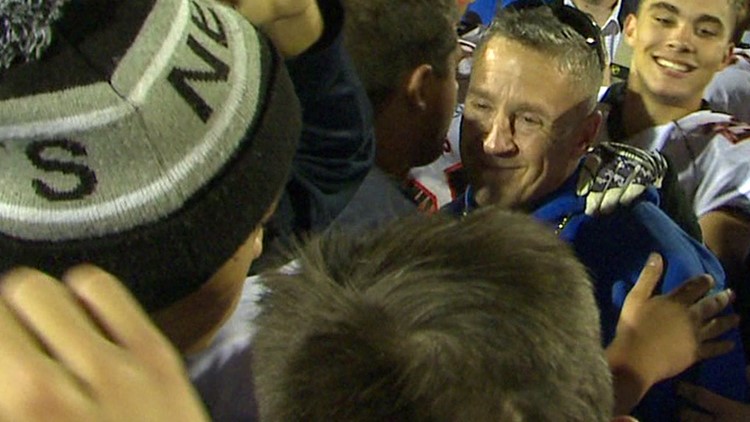(CNN) — A Seattle-area assistant high school football coach has been placed on paid leave for continuing to pray on the field after games, weeks after his school district warned him not to do so.
Bremerton High School assistant coach Joe Kennedy, whose suspension Wednesday, October 28, 2015 came a day before the school’s final regular game of the season, cannot resume his job until he agrees not to pray while on duty as a coach, the Bremerton School District said in a letter posted online.
“While the district appreciates Kennedy’s many positive contributions to the BHS football program … Kennedy’s conduct poses a genuine risk that the district will be liable for violating the federal and state constitutional rights of students or others,” the letter reads.
Kennedy’s case made headlines after the district ordered him in September to stop on-field post-game prayers, saying his years-long practice could be perceived as district endorsement of religion in violation of the First Amendment’s Establishment Clause.
Related: Despite orders, Washington HS coach prays on field after game
Kennedy, who says he has prayed at the 50-yard line after games since he was hired in August 2008, initially abided by the directive. But, with a religious freedom legal organization asserting that he had a right to do so, he prayed at midfield after the school’s October 16 homecoming game.
The coach says that his prayers are private, and that while some students end up joining him, they do so of their own volition.
The Liberty Institute, the Texas-based group representing Kennedy, said it will sue the school on his behalf, arguing the school was violating his rights under Title VII of the Civil Rights Act, saying it wasn’t honoring his request for religious accommodation.
“We tried to meet with the school officials in person, but they refused to meet. We were only able to have a brief hour and a half call with their lawyer, and the result was a letter banning private prayer just a few hours before last Friday’s game,” the institute’s deputy chief counsel Hiram Sasser said in a post reacting to Kennedy’s suspension. “It is unfortunate this school district is choosing litigation instead of a simple meeting.”
The coach’s defiance at homecoming
Kennedy found himself surrounded by supporters when he prayed on the field after the October 16 game. He cried as he spoke to reporters.
“I’ve got my eyes closed and I feel all these people around me. I’m like, God, I hope those aren’t kids,” Kennedy told CNN affiliate KIRO of Seattle and other media outlets. “I’m sitting there and I’m going, ‘God, thank you for this opportunity.’ And … if this is the last time I step on the field with these guys. …”
According to The Seattle Times, Kennedy, 46, has never asked anyone else to participate in the postgame prayer.
The prayer, according to The Times, is a version of the following sentiment: “Lord, I thank you for these kids and the blessing you’ve given me with them. We believe in the game, we believe in competition and we can come into it as rivals and leave as brothers.”
The district said in a September letter to the coach that he would still be permitted to speak to members of both teams after games, so long as the talk didn’t include religious expressions, including prayer.
“The district is in no way taking away an athletic coach’s freedom of expression,” Superintendent Aaron Leavell said in a statement posted to the organization’s website. “What we are doing is what every state-funded agency and school district must do: abide by the laws that govern us.”
In Wednesday’s letter, the district said it has offered Kennedy a private location to use for personal prayer after games, such as areas in the school building or in the stadium press box. But Kennedy declined, the letter says.
“Instead, his legal representatives have clearly stated in the media that an accommodation that does not allow Kennedy the spotlight of the 50-yard line immediately following games will be unacceptable to him,” the letter reads.
Sasser, of the Liberty Institute, has written that although the First Amendment forbids religious activity that is sponsored by the government, it “protects religious activity that is initiated by individuals acting privately, as is the case with Coach Kennedy.”
“No reasonable observer could conclude that a football coach who waits until the game is over and the players have left the field and then walks to midfield to say a short, private, personal prayer is speaking on behalf of the state,” Sasser wrote.
Kennedy, in an interview earlier this month with the Bremerton Patriot newspaper, said he would fight for the ability to pray on the field.
“Whatever happens happens, you know,” he said, according to the Patriot. “But I’m going to be bold in my faith and I’m going to fight the good fight, and I want to set that example for every one of the kids if you believe in something.”



